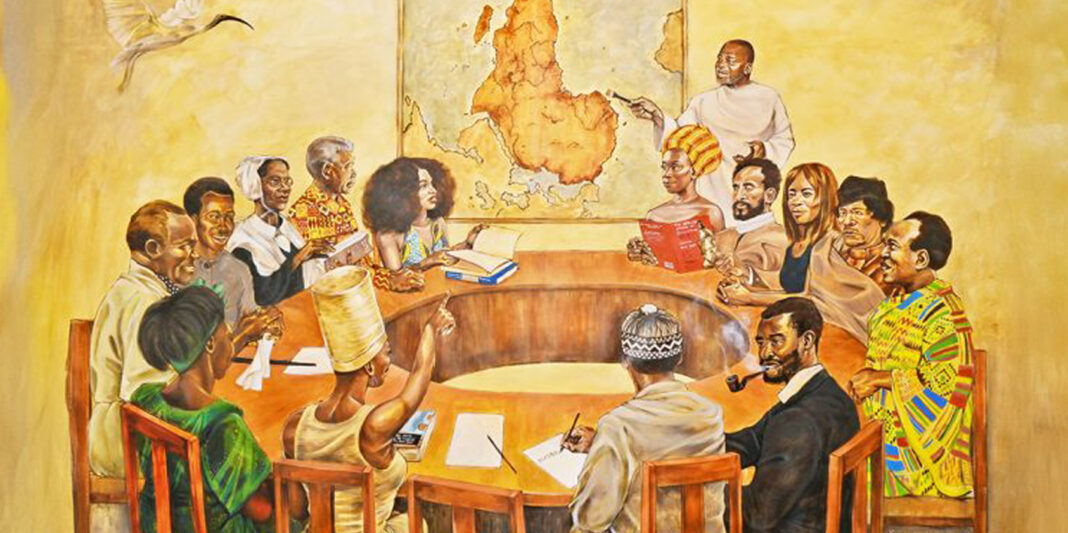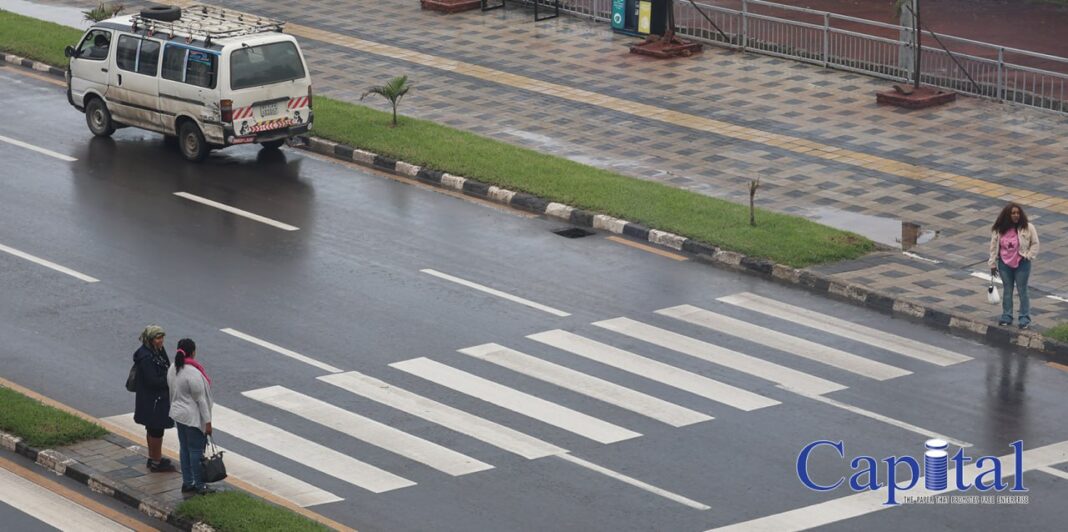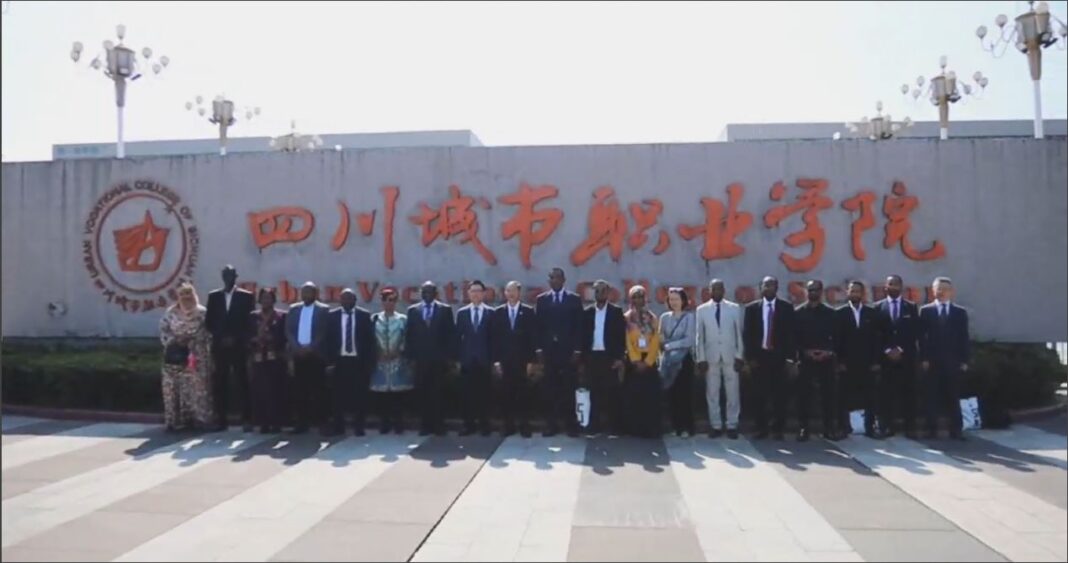A monumental artwork depicting some of Africa’s great legends, past and present, in front of a reversed map of Africa, seeks to establish the true story of Africa as told by Africans.
The centrepiece for Africa’s longest-running contemporary art fair, FNB Art Joburg is a monumental 3m by 2m canvas, Africa Re-Union, which reverses the context of the infamous 1884 Berlin Conference where Africa was carved up and divided among European colonial powers.
It has been described as an event “where art became manifesto and memory became movement” by restoring the continent as author of its own story and architect of its own destiny.
Conceived and co-created by the pan-Africanist founder of Brand Africa, Thebe Ikalafeng, realised on canvas by South African artist Mark Modimola, and anchored in history by Professor Kwesi DLS Prah, Africa Re-Union is not only an artwork but a challenging declaration to reimagine the African story and history.
One of the features of the painting is an inverted map of Africa – literally and philosophically – using the Equal Earth projection to restore the continent’s true scale and dignity. Rendered without borders, it corrects centuries of cartographic distortion that made Africa appear smaller than its true size.
This echoes the call made by the Correct the Map campaign and supported by the African Union, Speak Up Africa, Africa No Filter and an army of historians and cartographers which challenges the outdated Western cartography and asks for equal-area maps that restore Africa’s true size, scale, and significance in the world.
At the heart of the work stands a round table – because here there is no hierarchy, every voice matters equally. Seated are some of Africa’s legendary leaders re-imagining its future: Ghana’s founding President Kwame Nkrumah; Kenyan environmentalist Wangarĩ Maathai; South Africa’s Nelson Mandela; Tanzania’s Julius Nyerere; Zambia’s Kenneth Kaunda; Ethiopia’s founding host of the OAU, Emperor Haile Selassie; Cabo Verde and Guinea Bissau’s Amílcar Cabral; Senegal’s poet President Léopold Senghor and anthropologist Cheikh Anta Diop; Libya’s Muammar Gaddafi, proponent of the ‘United States of Africa’; Nigerian writer Chimamanda Ngozi Adichie; South African anti-activist Zulaikha Patel; the USA’s civil rights activist and pan-Africanist W.E.B. Du Bois; economist and writer Dambisa Moyo; USA’s freed slave Sojourner Truth; South African singer, Miriam Makeba, the first artist to address the United Nations in 1963; cultural activist Credo Mutwa; pan-African advocate for a brand-led renaissance, Thebe Ikalafeng; and advocate of the African Renaissance, former South Africa President, Thabo Mbeki.
Their presence on the canvas affirms that Africa’s story has always had authors – even when unrecognised. It’s a gathering of the diaspora, the enslaved whose voices were stolen, the revolutionaries and artists, the freedom fighters and feminists, writers, sanusis, and youth across the private and public sectors and the civil service. Together, they embody the unfinished conversation of Africa’s identity, memory and destiny.
One chair is left empty at the table. It is the most important seat of all – it belongs to the Unborn Child who will inherit this Africa, the ancestor whose spirit still hovers, the diaspora longing to remain rooted, and every African alive today who must rise, sit, and take their rightful place at the table of history. The empty chair is not absence; it is invitation.
In a symbolic act of permanence, the original canvas will not be sold. Ikalafeng has instead gifted it to the UNISA Art Gallery at the University of South Africa in Pretoria, ensuring the work lives where Africa’s future is being studied and shaped. Africa Re-Union will be preserved not as a commodity, but as a covenant – a manifesto for generations to come. Only 2063 signed limited reproductions will be made available to ensure the conversation goes far. The number is a reminder of the AU’s Agenda 2063, aiming for an integrated, peaceful and prosperous Africa.
“The Africa Re-Union is not a return to the 1884 Berlin Conference table, but the setting of our own table: equal, sovereign, and unapologetically African. It is both remembrance and declaration: Africa is whole again. This time, no one will define us but us,” said Thebe Ikalafeng, Conceptual Author and Chief Curator of the Africa Re-Union.
“For me, Africa Re-Union is about shifting the canvas of our imagination. It’s to challenge how we see ourselves and how the world sees us; not as fragmented, diminished, or peripheral, but as whole, central and sovereign. This work is both a mirror and a map, and
reflects our past, but points us toward a future we must author ourselves,” said Mark Modimola, Visual Artist of the Africa Re-Union.
“Johannesburg has always been a city of convergence, where Africa meets the world. To host the Africa Re-Union at FNB Art Joburg affirms our city’s role as a crucible of ideas, creativity and cultural leadership. This is more than an artwork – it is a call to re-centre Africa in history and in the future,” said Vuyisile Mshudulu, Director of Arts, Culture and Heritage for the City of Johannesburg.
“Correcting the map is about more than geography. It’s about dignity. The way Africa is represented shapes how
the world sees us, and how we see ourselves. The Africa Re-Union is a bold and creative way of reclaiming that story, insisting that Africa is seen in its true scale, power and possibility,” said Moky Makura, Executive Director of Africa No Filter.
Africa Re-Union was unveiled at the 18th FNB Art Joburg opening night, in a live performance led by celebrated actor Aubrey Poo and acclaimed poet Napo Mashiane, with costumes designed by award-winning wardrobe stylist, Sheli Masondo. The performance re-imagined the infamous 1884 Berlin Conference, but this time with African agency, voice, and vision at the table. “In curating the works and the performance, what we wanted to do was ensure that the story itself — not just the objects or aesthetics — carries the work. It is the story that gives it power and makes it unlike anything else,” Dr. Sechaba Maape, Africa Re-Union curatorial advisor.







